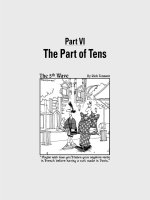PART VI
Bạn đang xem bản rút gọn của tài liệu. Xem và tải ngay bản đầy đủ của tài liệu tại đây (256.18 KB, 63 trang )
PART VI
Directions: In Questions 141-160, each sentence has four
words or phrases underlined. The four underlined parts of
the sentence are marked (A), (B), (C), (D). You are to
identify the one underlined word or phrase that should be
corrected or rewritten. Then, on your answer sheet, find
the number of the question and mark your answer.
Example
Sample Answer
All employee (A) are required
(A) (B) (C) (D)
to wear (B) their identification (C)
badges while (D) at work.
The underlined word "employee' is not correct In this
sentence. This sentence should read, "All employees are
required to wear their identification badges while at
work." Therefore, you should choose answer (A).
Now begin work on the questions.
141. The messenger (A) had
the receipt (B) signed (C)
before he left an office (D).
141. The messenger (A) had
the receipt (B) signed (C)
before he left an office (D).
141. (D) Reference to a specific
office requires the definite article:
before he left the office. Choices
(A) and (B) are correct noun
phrases. Choice (C) is a correct
past participle.
142. Paychecks (A) are
distributed to all employees
(B) on (C) Friday afternoons
in (D) 3:00.
142. Paychecks (A) are
distributed to all employees
(B) on (C) Friday afternoons
in (D) 3:00.
142. (D) The preposition at refers
to specific times: at 3:00. Choice
(A) is a correct noun. Choice (B)
is a correct noun phrase. Choice
(C) is a correct preposition.
143. The management team
(A) worked hard on the
proposal and are (B)
disappointed to discover (C)
that their proposal wasn't (D)
chosen.
143. The management team
(A) worked hard on the
proposal and are (B)
disappointed to discover (C)
that their proposal wasn't (D)
chosen.
143. (B) Management team is a
singular subject and requires a
singular verb: The management
team . . . is disappointed. Choice
(A) is a correct noun phrase.
Choice (C) is a correct infinitive.
Choice (D) is a correct verb.
144. Ms. Park's evaluations
show that her (A) supervisors
considers (B) her to be (C) an
(D) efficient employee.
144. Ms. Park's evaluations
show that her (A) supervisors
considers (B) her to be (C) an
(D) efficient employee.
144. (B) Supervisors is a plural
subject and requires a plural
verb: her supervisors consider her.
Choice (A) is a correct pronoun.
Choice (C) is a correct infinitive.
Choice (D) is a correct article.
145. Because (A) the architects
wanted to finish (B) the
project, they decided not to
take its (C) break until (D)
later.
145. Because (A) the architects
wanted to finish (B) the
project, they decided not to
take its (C) break until (D)
later.
145. (C) Architects requires a
plural pronoun that refers to
people: the architects decided not
to take their break. Choice (A) is a
correct conjunction. Choice (B) is
a correct infinitive. Choice (D) is a
correct preposition.
146. Mr. Honda wants to
know (A) where the supplies
are kept (B), in case he need
(C) more of them (D) while
we're away.
146. Mr. Honda wants to
know (A) where the supplies
are kept (B), in case he need
(C) more of them (D)while
we're away.
146. (C) He is a singular subject
and requires a singular verb: in
case he needs more of them.
Choices (A) and (B) are correct
verbs. Choice (D) is a correct
prepositional phrase.
147. Could you find a letter
(A) that you showed me (B)
yesterday morning that was
(C) from Mr. White of (D) the
Best Service Company?
147. Could you find a letter
(A) that you showed me (B)
yesterday morning that was
(C) from Mr. White of (D) the
Best Service Company?
147. (A) Reference to a specific
letter requires the definite article:
the letter that you showed me.
Choice (B) is a correct pronoun.
Choice (C) is a correct verb.
Choice (D) is a correct
preposition.
148. Mr. Mura is worried that
he wouldn't be (A) able to find
(B) a parking space when he
comes (C) to the office (D) this
afternoon.
148. Mr. Mura is worried that
he wouldn't be (A) able to find
(B) a parking space when he
comes (C) to the office (D) this
afternoon.
148. (A) Future tense indicated by
this afternoon requires the
negative form of will: that he
won’t be able to find a parking
space. Choice (B) is a correct
verb. Choice (C) is a correct
subject and verb. Choice (D) is a
correct noun phrase.









